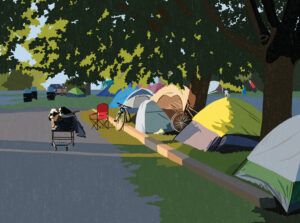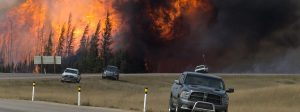
People & Culture
Placing the Pandemic in Perspective: Coping with curfew in Montreal
For unhoused residents and those who help them, the pandemic was another wave in a rising tide of challenges
- 2727 words
- 11 minutes
People & Culture

Spring floods and summer forest fires are facts of life in some parts of Canada. Normally, emergency services in high-risk areas are well prepared to deal with the natural disasters common to their landscapes.
But as the world battles the COVID-19 pandemic, emergency agencies are stretched to their limits.
Defence Minister Harjit Sajjan says the federal government is ready to mobilize up to 24,000 Canadian troops to help during the pandemic, whether that be in the form of humanitarian aid or natural disaster response. Two Royal Canadian Navy crews have been ordered to sequester for two weeks before heading out to sea to then wait for a call.
“This option gives us the best chance of avoiding a community spread within one of the ships should someone have contracted the virus at the last minute due to natural family interactions,” says Rear-Admiral Craig Baines, Maritime Atlantic Forces commander.
How long will troops remain in what is now effectively a deployment? That depends on the pandemic’s trajectory — and what happens in flood-and-fire season.
Pontiac, Quebec, a community of just 6,000 people, has experienced five natural disasters in the last two years, including a tornado. They’ve created a flood task force with COVID-19 in mind, to make sure health department recommendations are kept at the forefront.
Physical distancing means no man-to-man sandbagging on the banks of the Ottawa River this year. And firefighters — who are trained to never work alone — will have to come up with a new plan.
In addition to ramping up for peak forest fire season, spring is when specialized fire departments conduct training and forest management. Across the border in California, prescribed burns — typically used to reduce available fuel for rampaging fires — have been cancelled. At least two weeks of in-person firefighter training have been cancelled by the U.S. Forest Service, and in Washington State, inter-agency fire training academies were cancelled.
“This is a new world. It’s not one we’ve had to deal with before,” Hilary Franz, commissioner for the Department of Natural Resources, told Vice. “We’re thinking about how to transform firefighting in this new environment.”
Experts like Emdad Haque, a professor at the University of Manitoba’s Natural Resources Institute, say COVID-19 has so far offered valuable lessons that can be applied to preparing for and responding to natural disasters — for example, identifying risks well ahead of time and preparing accordingly, rather than waiting for an extreme environmental event to kick off
According to Haque, there are also lessons to be learned in how information is delivered and disseminated to the public at large. “Transparency is critical to successfully prepare and respond to floods or forest fires so that communities — both the general public and the politicians in charge — can take necessary actions at the right time to reduce disaster loss.”
Haque says communities must implement “effective institutional frameworks” to plan for environmental risks and disasters during the COVID-19 pandemic. This includes policies, procedures and financial backing for potential situations.
“Communities are presently preoccupied and dealing with the ongoing pandemic, and in the short term, this is the most appropriate strategy,” says Haque. “However, communities cannot ignore other impending risks as well.”
Are you passionate about Canadian geography?
You can support Canadian Geographic in 3 ways:

People & Culture
For unhoused residents and those who help them, the pandemic was another wave in a rising tide of challenges

People & Culture
The story of how a critically endangered Indigenous language can be saved

Environment
Fire detection, forecasting, management — and how decisions are made

People & Culture
The death of an unhoused Innu man inspired an innovative and compassionate street outreach during the nightly curfew in 2021